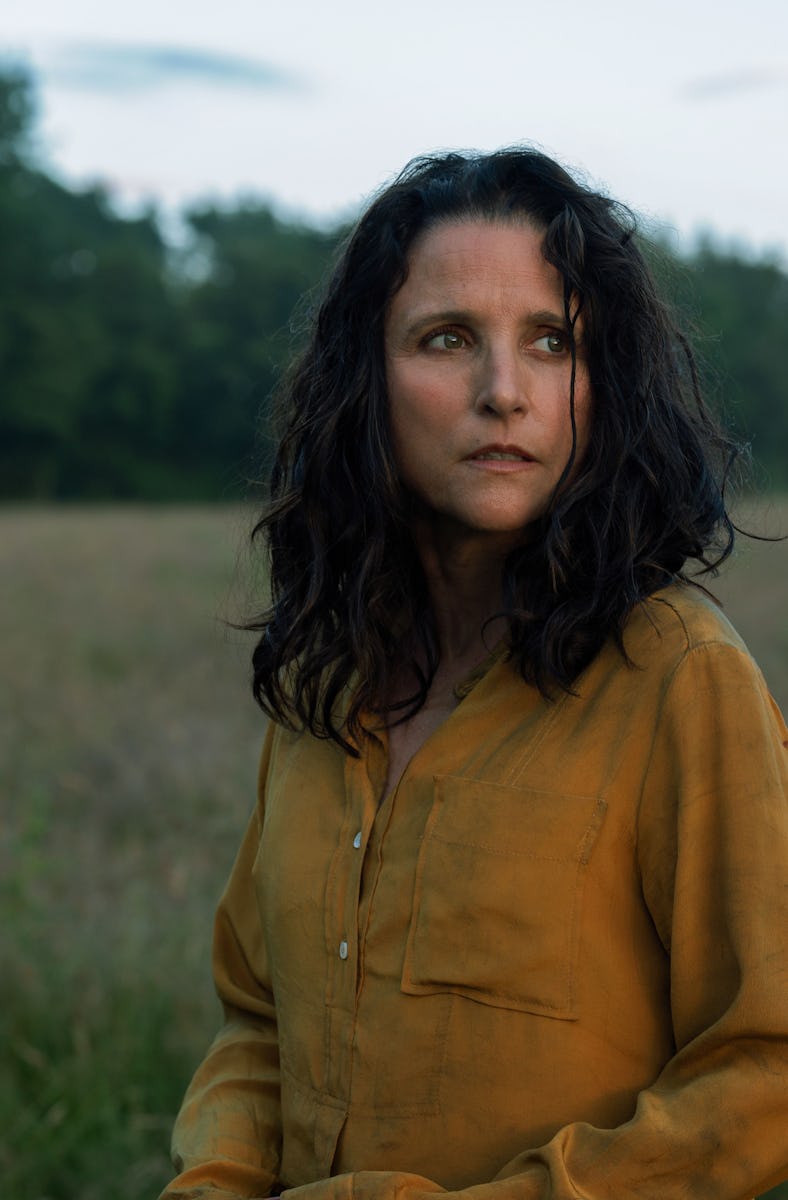Julia Louis-Dreyfus is Magnificent in The Strangely Enchanting Tuesday
The comedy legend faces Death in a moving, but slightly mawkish, fantasy drama.

Death looks a little different in Tuesday. Instead of the standard appearance of a cloaked, skeletal man, this Grim Reaper takes the form of a parrot, albeit one that’s grungy, filthy, and looks like he’s halfway dead too. Grudgingly, Death (voiced by Arinzé Kene) makes his way from one victim to the next, called to each person by their dying words. Those words never stop, echoing in Death’s head like constant white noise, until one day, Death arrives to kill Tuesday (Lola Petticrew), a terminally ill teenager whose lungs are about to give out. Realizing that she’s staring Death right in the face, Tuesday suddenly interrupts his creeping approach with a joke about a car full of penguins. Death laughs, and the voices stop. And thus begins the odd, lovely, and enchantingly strange directorial debut from Daina O. Pusić.
Tuesday walks a fine line between moving and mawkish, a thoughtful and high-concept portrait of a mother’s grief that also sometimes manages to be a little too cute. But thanks to a wholly dedicated performance from Julia Louis-Dreyfus, Tuesday manages to transcend its slightly thin premise.
Tuesday meets Death.
Louis-Dreyfus stars as Zora, the beleaguered mother of Tuesday who spends her days pawning off all her belongings to pay for medical expenses. But the situation has become untenable, and Zora has turned into a prickly, harsh woman who rudely orders Tuesday’s nurse (Leah Harvey) around and ignores Tuesday’s silent cries for attention. As Zora rattles on about her day, Tuesday finally gains her mother’s attention by stating that she is going to die that night. When Death, who had spent the day bonding with Tuesday, appears in front of Zora, she does the only thing a desperate mother can do: she kills Death and eats him.
The consequences of killing Death are predictably dire — your usual apocalyptic half-dead corpses, plagues of locusts, and whatnot — but Tuesday isn’t interested in that. Instead, it foregrounds Zora and Tuesday, who spend the day repairing their fractured relationship after so many years of dealing with Tuesday’s illness. Even as Zora lovingly dotes on her daughter, bathing her, teasing her, and playing word games with her, she’s only keeping the painful reality at bay. As the facade starts to crumble, and the reality of the lengths Zora went to for Tuesday start to reveal themselves, Tuesday takes an even stranger turn: Zora becomes Death itself.
Zora and Tuesday are forced to come to terms with Tuesday’s looming death.
Through all its strange twists and turns (one of which includes Louis-Dreyfus ballooning up to the size of a titan), Tuesday never loses sight of its central relationship between Zora and Tuesday. Louis-Dreyfus is magnificent in the role: angry, patently unlikable, and achingly vulnerable as a mother who has built her entire life around her daughter and resents it. But her situation (killing and eating Death aside) is painfully understandable, even as her selfish actions put the world itself at risk. Awful people are still allowed to grieve, and Louis-Dreyfus plays that idea up with more nuance than you’d expect. Lola Petticrew holds their own against Louis-Dreyfus admirably as the embittered teen who knows that her days are numbered. But Kene is the surprising standout as the voice of Death, giving a growling, deliberate performance with a voice so low and deep it sounds like it emanates from the bowels of Hell.
With its small cast, Tuesday sometimes feels a little too limited, and perhaps a little obvious that it was a Covid production. Despite all the layers of grief it unpacks throughout its strange, meandering journey, towards the end of its runtime, Tuesday feels like it has eked out all it can out of its central relationship. Zora and Tuesday exist only within these few days, and we don’t get a sense of who they were before this bizarre odyssey they find themselves on. That’s the biggest failing of Pusić’s script, and perhaps the biggest indicator that this is the film of a first-time director — even if Pusić’s confident direction and Alexis Zabé’s warm, hazy cinematography point to a much more seasoned filmmaker.
All the same, Tuesday’s grand, cosmic ambitions and small, intimate stakes combine into a lovely, whimsical medley that doesn’t overstay its welcome. Even if its sentimentality tips over into overly saccharine at times, there’s no denying that Tuesday’s unique portrait of grief is a moving one.